Watched October 1 - 7, 2007: Old Japan and Modern Korea: Murata, Lee and Im
Rojo no reikon / Souls on the Road (Minoru Murata, 1921)
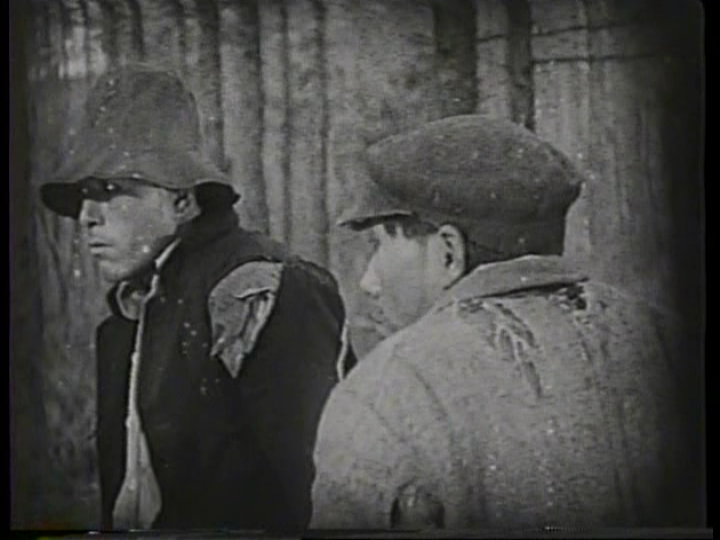 As far as I can tell, this film appears to be the oldest Japanese feature film that survives in essentially complete form. And it is also one of the first to feature women (and girls) playing female characters. Given its early date,
As far as I can tell, this film appears to be the oldest Japanese feature film that survives in essentially complete form. And it is also one of the first to feature women (and girls) playing female characters. Given its early date, 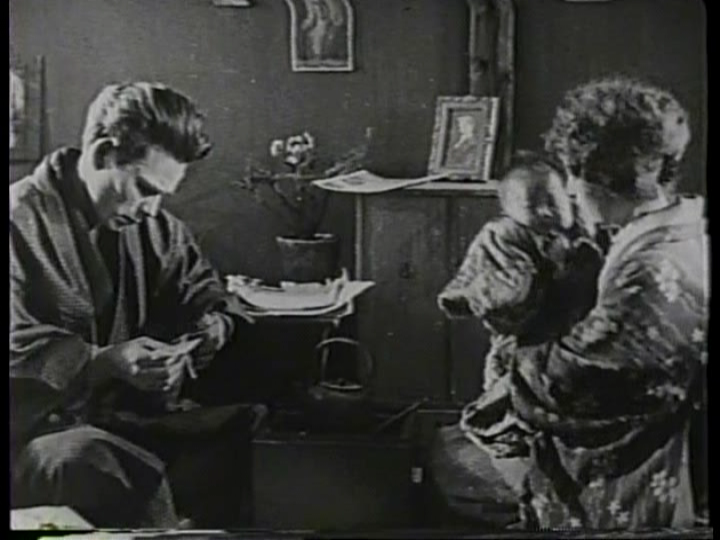 I was rather surprised to discover just how sophisticated this film was, both visually and narratively. The film follows several groups of people, whose paths intersect at least briefly. Some of the characters are wanderers, others are not.
I was rather surprised to discover just how sophisticated this film was, both visually and narratively. The film follows several groups of people, whose paths intersect at least briefly. Some of the characters are wanderers, others are not. 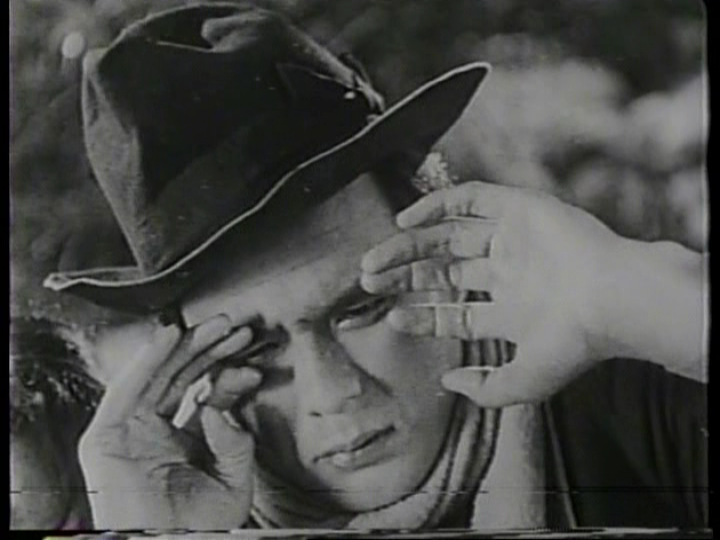 The two primary groups are a man with his wife and young daughter, and a couple of tramps recently released from prison. We also have a teenaged brother and sister who are itinerant performers, the members of a couple of well-to-do rural households, and a group of poor rural workers.
The two primary groups are a man with his wife and young daughter, and a couple of tramps recently released from prison. We also have a teenaged brother and sister who are itinerant performers, the members of a couple of well-to-do rural households, and a group of poor rural workers. 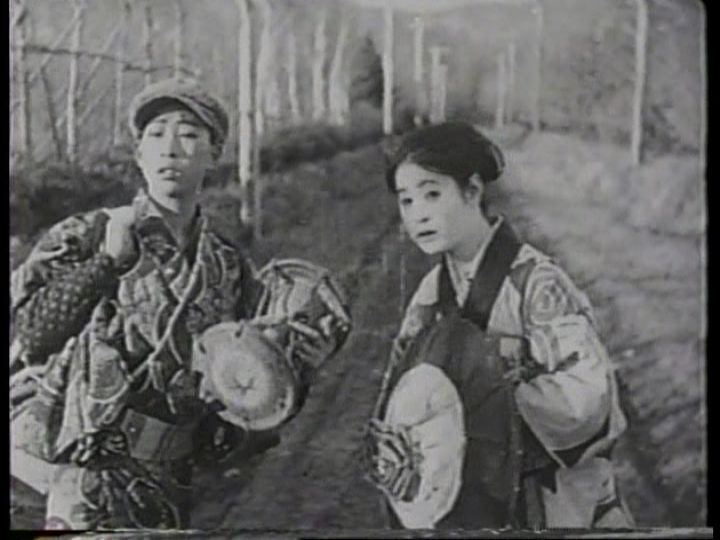 The stories used in this film are drawn from various sources, including Gorky's Lower Depths and a German melodrama. The film jumps from group to group, from present to past and back, and into daydreams and alternative versions of reality.
The stories used in this film are drawn from various sources, including Gorky's Lower Depths and a German melodrama. The film jumps from group to group, from present to past and back, and into daydreams and alternative versions of reality.
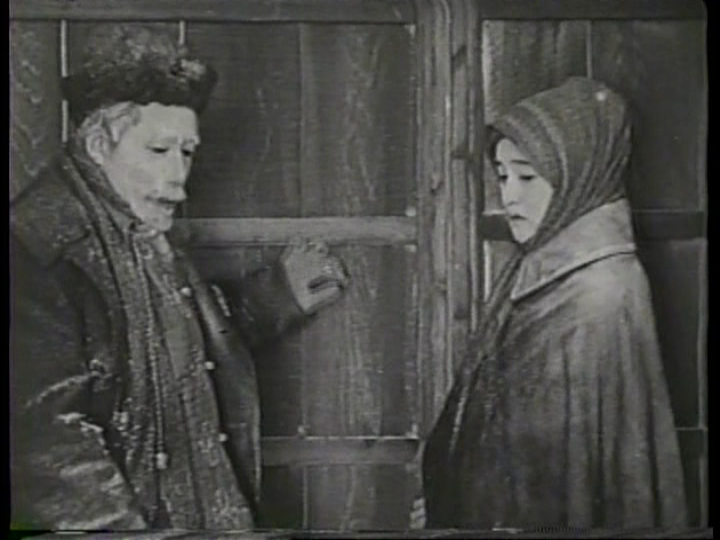 Given the multiplicity of characters and plot lines, it is almost impossible to present a simple version of what goes on in this film. At the core of the film, however is a prodigal son seeking forgiveness (or at least acceptance of his innocent wife and daughter)
Given the multiplicity of characters and plot lines, it is almost impossible to present a simple version of what goes on in this film. At the core of the film, however is a prodigal son seeking forgiveness (or at least acceptance of his innocent wife and daughter)  from a harsh and unbending father. In this case, we see the past as well as the present of this broken family. For contrast, we see another wealthy household, headed by a teen-aged girl (doing her best to look like Mary Pickford) and the steward of the estate.
from a harsh and unbending father. In this case, we see the past as well as the present of this broken family. For contrast, we see another wealthy household, headed by a teen-aged girl (doing her best to look like Mary Pickford) and the steward of the estate.  She seems to be especially fond of a handsome young man who helps with chores (played by the director himself). The wandering ex-convicts luckily cross paths with this household rather than the other. As it is Christmas-time, the congenial household prepares for a party.
She seems to be especially fond of a handsome young man who helps with chores (played by the director himself). The wandering ex-convicts luckily cross paths with this household rather than the other. As it is Christmas-time, the congenial household prepares for a party. 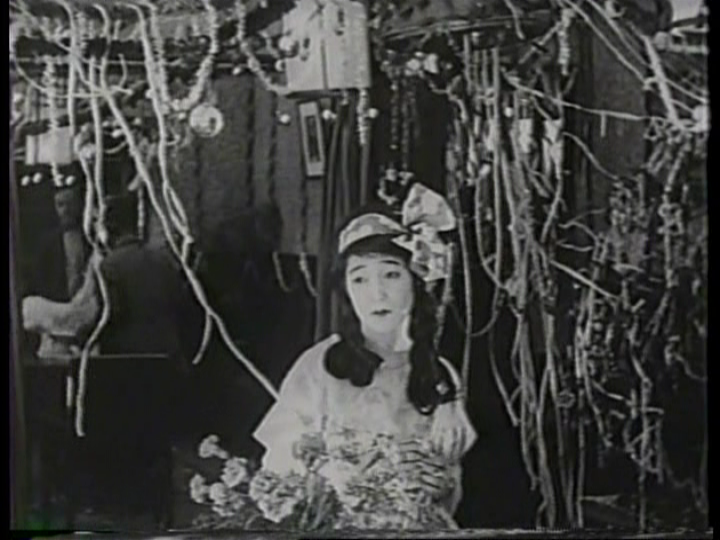 Its young mistress, feeling that they need more people to join in the celebration, sends her carriage to pick up the residents from the district's shelter for the poor. Meanwhile, the prodigal and his family get a far less welcoming reception -- despite the time of year and the threatening weather (a major snow storm is coming).
Its young mistress, feeling that they need more people to join in the celebration, sends her carriage to pick up the residents from the district's shelter for the poor. Meanwhile, the prodigal and his family get a far less welcoming reception -- despite the time of year and the threatening weather (a major snow storm is coming).
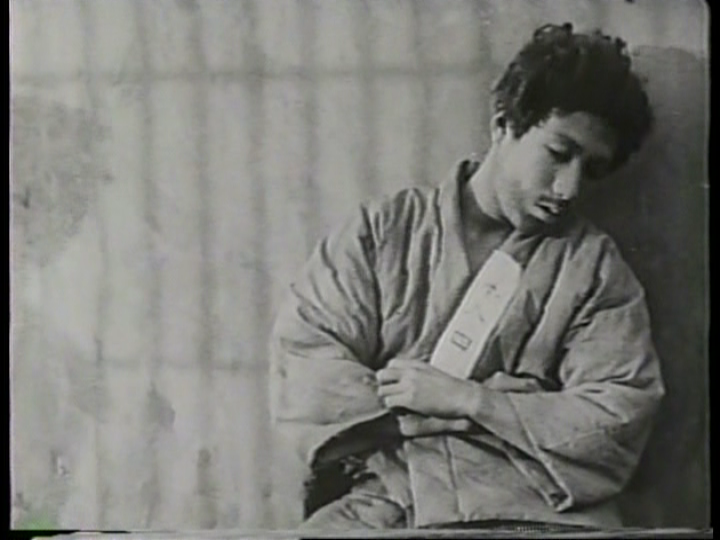 Visually, the film's makers seem to have been keeping very much up-to-date as to what was going on in Hollywood technique-wise (despite the fact that this was shot by the head of the conservative cinematographic faction at Shochiku). But more importantly,
Visually, the film's makers seem to have been keeping very much up-to-date as to what was going on in Hollywood technique-wise (despite the fact that this was shot by the head of the conservative cinematographic faction at Shochiku). But more importantly, 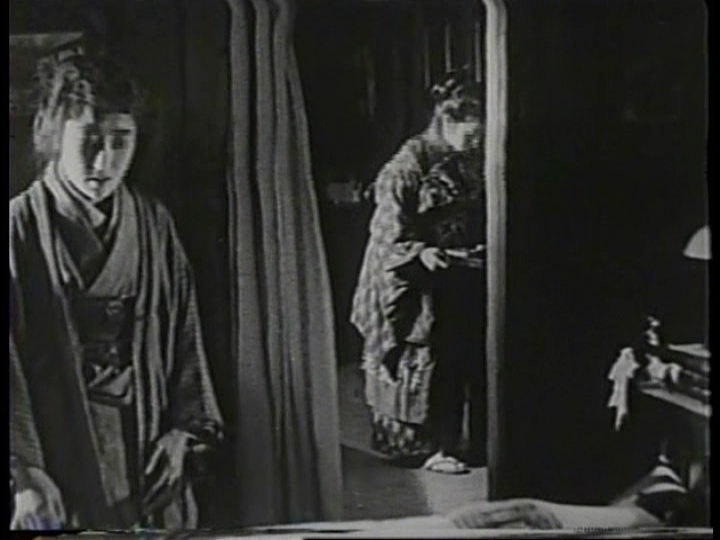 the visual imagery is often quite striking -- and beautiful. Apparently, the direction here was shared (to a considerable extent) by Kaoru Osanai (who played the hardbitten father and was also the film's executive producer),
the visual imagery is often quite striking -- and beautiful. Apparently, the direction here was shared (to a considerable extent) by Kaoru Osanai (who played the hardbitten father and was also the film's executive producer), 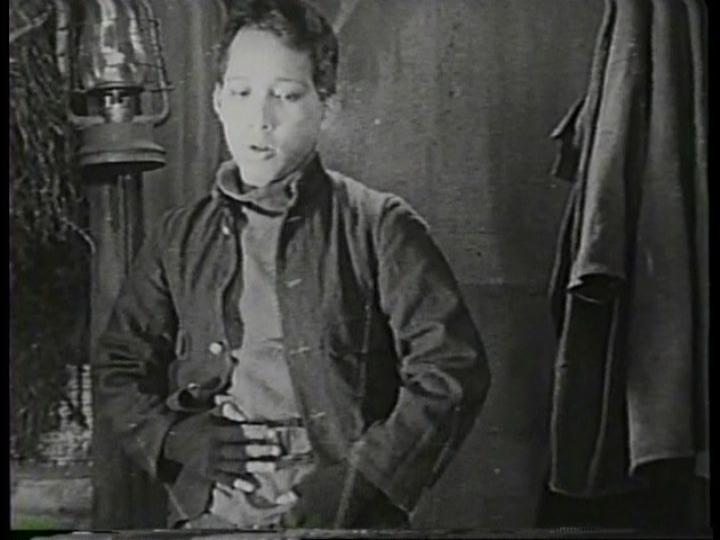 one of the leaders of Japan's shingeki (new theater) movement. While a subtitled print circulated a few years ago, as part of Shochiku's 110th anniversary retrospective, there is unfortunately no subbed (or even unsubbed) DVD available at present.
one of the leaders of Japan's shingeki (new theater) movement. While a subtitled print circulated a few years ago, as part of Shochiku's 110th anniversary retrospective, there is unfortunately no subbed (or even unsubbed) DVD available at present.
Orae-doen jeongwon / The Old Garden (IM Sang-soo, 2006)
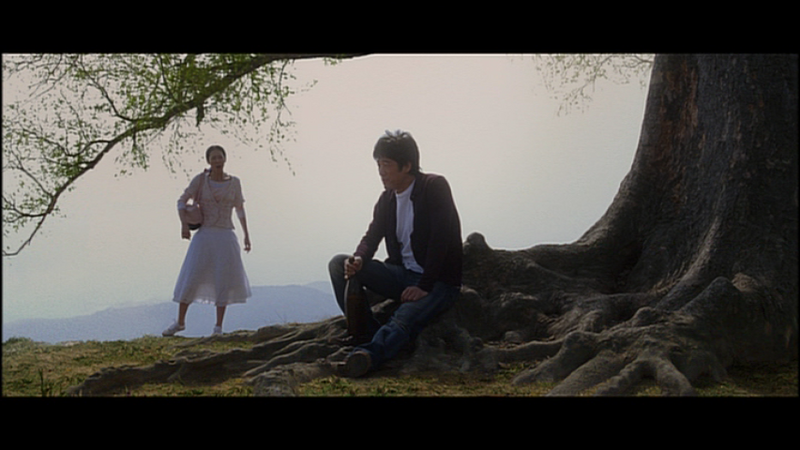 Im's woefully under-appreciated President's Last Bang was one of the most savage black comedies of recent years. Rather than focusing on those at the top of the political world in his newest film,
Im's woefully under-appreciated President's Last Bang was one of the most savage black comedies of recent years. Rather than focusing on those at the top of the political world in his newest film,  he depicts the students involved in the unrest at the beginning of the 1980s and looks at the fate of at least a few of them. The main focus is on Oh Hyun-woo, a student activist (played by Ji Jin-hee), and Han Yoon-hee, a painter (played by Yum Jung-ah -- the stepmother in Tale of Two Sisters).
he depicts the students involved in the unrest at the beginning of the 1980s and looks at the fate of at least a few of them. The main focus is on Oh Hyun-woo, a student activist (played by Ji Jin-hee), and Han Yoon-hee, a painter (played by Yum Jung-ah -- the stepmother in Tale of Two Sisters). 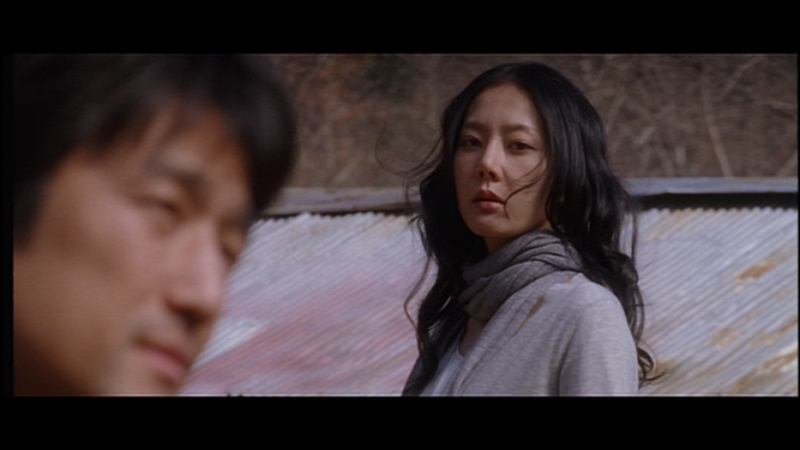 Casual acquaintances at first, the two become romanticaly involved when Oh (on the run from the police) hides out at Yoon-hee's rural retreat (presumably her family's ancestral farm). He gets caught after returning to fight the good fight, and is sent to prison (where he is tortured) for seventeen years.
Casual acquaintances at first, the two become romanticaly involved when Oh (on the run from the police) hides out at Yoon-hee's rural retreat (presumably her family's ancestral farm). He gets caught after returning to fight the good fight, and is sent to prison (where he is tortured) for seventeen years. 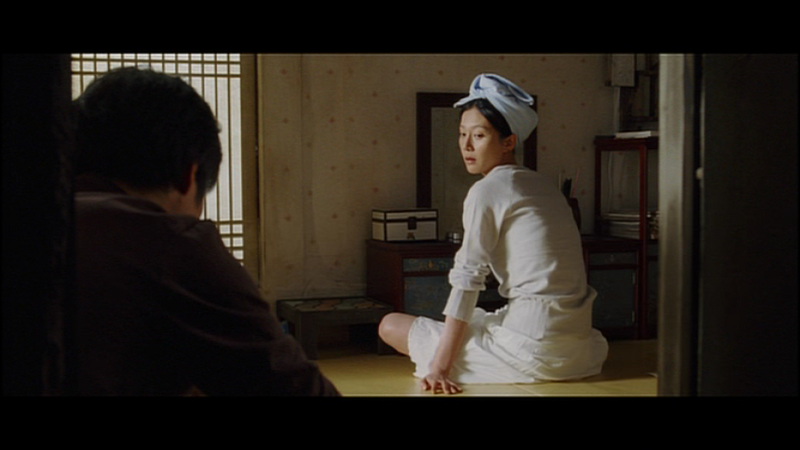 She is left alone, pregnant. Not being married, she is not allowed to visit him in prison (or even have her letters to him delivered). She goes on with her painting, but develops cancer and dies before his release -- leaving her 10 year-old child to be raised by relatives.
She is left alone, pregnant. Not being married, she is not allowed to visit him in prison (or even have her letters to him delivered). She goes on with her painting, but develops cancer and dies before his release -- leaving her 10 year-old child to be raised by relatives.
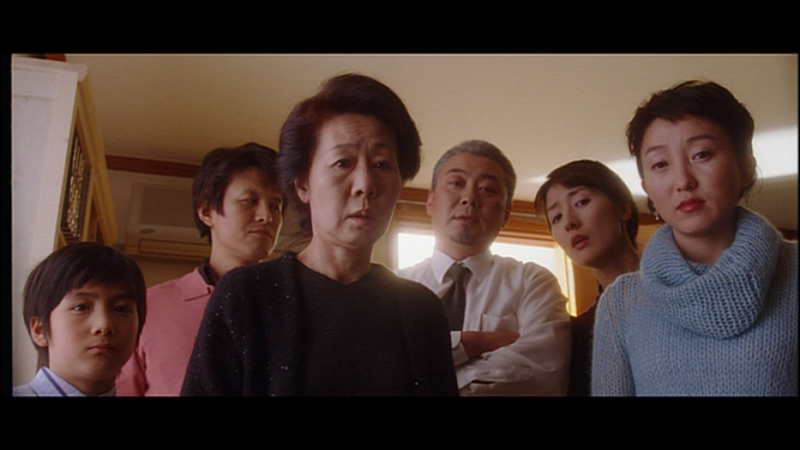 One learns the basis scenario of the film very early on, so little I said above really constitutes a spoiler. The film actually starts with the day Oh is released. Im shuttles us back and forth in time --
One learns the basis scenario of the film very early on, so little I said above really constitutes a spoiler. The film actually starts with the day Oh is released. Im shuttles us back and forth in time -- 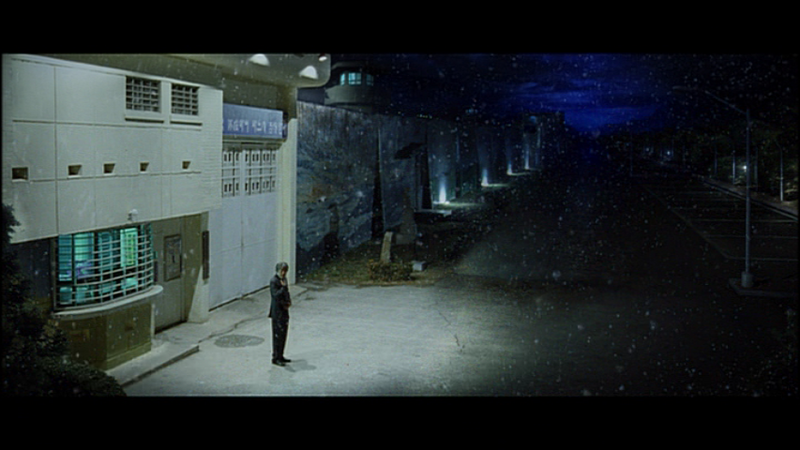 as Oh is reunited with his own family, visits old activist colleagues, and returns to the place where he lived with Yoon-hee. While the plot outline may sounds melodramatic and depressing, the film itself has a more optimistic and positive tone.
as Oh is reunited with his own family, visits old activist colleagues, and returns to the place where he lived with Yoon-hee. While the plot outline may sounds melodramatic and depressing, the film itself has a more optimistic and positive tone. 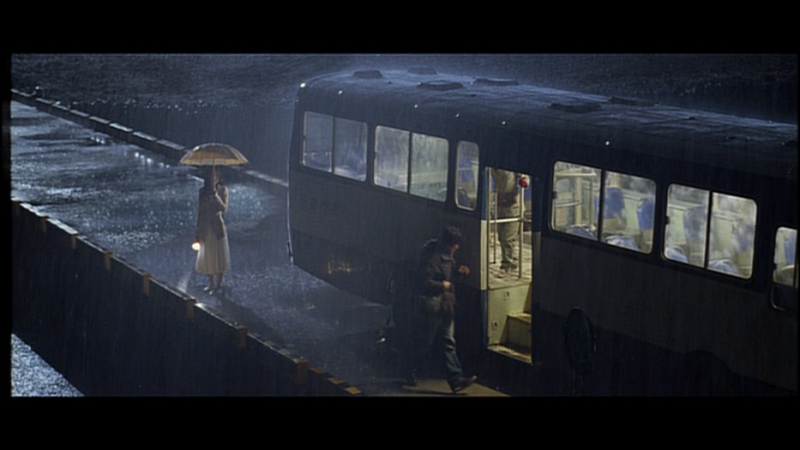 This is one of the most visually compelling films of the past year or so -- and the subtitled Korean DVD does a good job of presenting it (pending its unlikely distribution in the United States).
This is one of the most visually compelling films of the past year or so -- and the subtitled Korean DVD does a good job of presenting it (pending its unlikely distribution in the United States).
More screen shots:
http://i9.photobucket.com/albums/a59/mkerpan/oct_07/garden01.png
http://i9.photobucket.com/albums/a59/mkerpan/oct_07/garden04.png
http://i9.photobucket.com/albums/a59/mkerpan/oct_07/garden05.png
http://i9.photobucket.com/albums/a59/mkerpan/oct_07/garden06.png
http://i9.photobucket.com/albums/a59/mkerpan/oct_07/garden09.png
http://i9.photobucket.com/albums/a59/mkerpan/oct_07/garden13.png
http://i9.photobucket.com/albums/a59/mkerpan/oct_07/garden14.png
http://i9.photobucket.com/albums/a59/mkerpan/oct_07/garden15.png
http://i9.photobucket.com/albums/a59/mkerpan/oct_07/garden16.png
http://i9.photobucket.com/albums/a59/mkerpan/oct_07/garden17.png
http://i9.photobucket.com/albums/a59/mkerpan/oct_07/garden18.png
http://i9.photobucket.com/albums/a59/mkerpan/oct_07/garden19.png
http://i9.photobucket.com/albums/a59/mkerpan/oct_07/garden20.png
Milyang / Secret Sunshine (LEE Chang-dong, 2007)
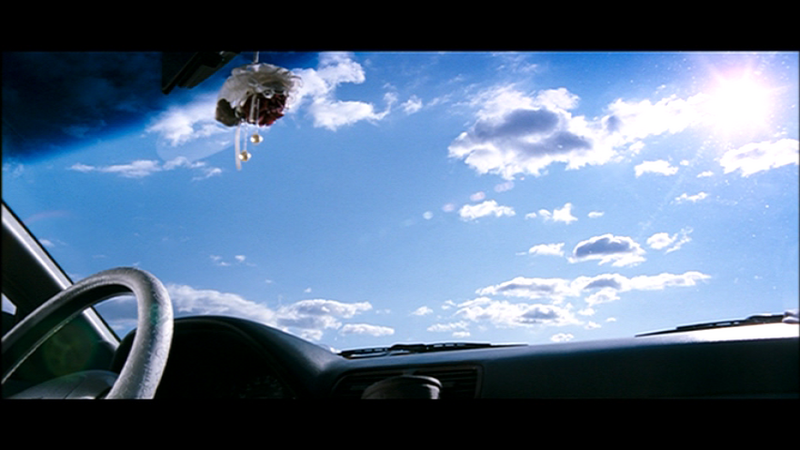 Possibly the best film of the past year, and almost surely one of the most emotionally wrenching. If one is worried about spoilers, stop reading now -- as one can not talk intelligibly about the film without confronting just what happens in this film.
Possibly the best film of the past year, and almost surely one of the most emotionally wrenching. If one is worried about spoilers, stop reading now -- as one can not talk intelligibly about the film without confronting just what happens in this film. 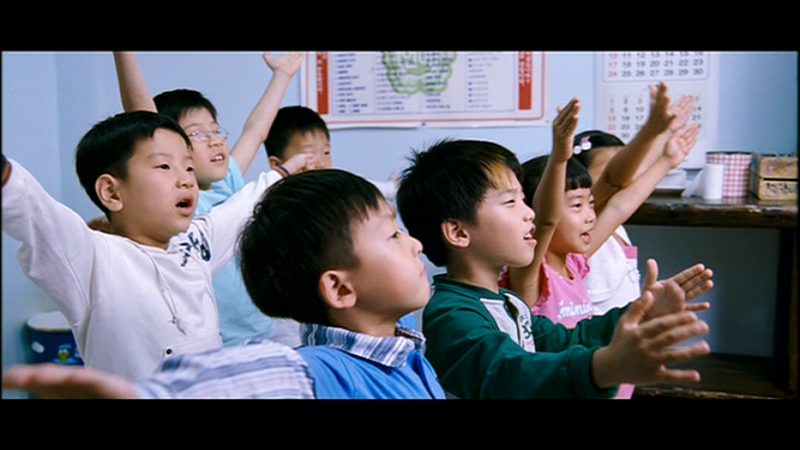 It is primarily about a woman's response to the murder of her son by a kidnapper. The woman here is portrayed in an almost unbearably realistic fashion by Jeon Do-yeon (who won the best actress award at Cannes for her efforts).
It is primarily about a woman's response to the murder of her son by a kidnapper. The woman here is portrayed in an almost unbearably realistic fashion by Jeon Do-yeon (who won the best actress award at Cannes for her efforts).
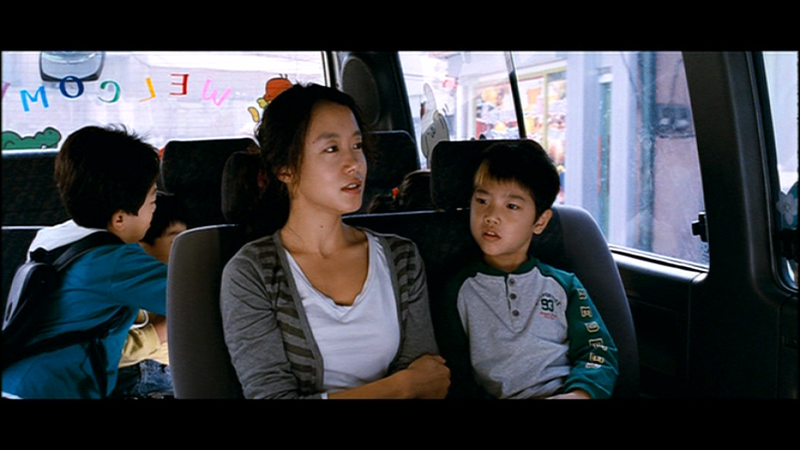 Jeon plays Shin-ae, a widow with a young son -- who moves to Milyang (her husband's birthplace) after his death. The move might have made some sense if her husband's family still lived in the town, but they don't. So she winds up in a rather minor town, knowing no one, hoping to set up in business giving piano lessons.
Jeon plays Shin-ae, a widow with a young son -- who moves to Milyang (her husband's birthplace) after his death. The move might have made some sense if her husband's family still lived in the town, but they don't. So she winds up in a rather minor town, knowing no one, hoping to set up in business giving piano lessons.  Luckily, she knows one person there, Jong Chan, a car repairman (Song Kang-ho) who came to her aid when her car broke down at the end of her move, right as she was near the edge of town. Shin-ae has a bit of trouble fitting in, as she doesn't have the best social skills and judgment. Trying to impress her fellow small business people, she claims to be in the market for a big real estate investment.
Luckily, she knows one person there, Jong Chan, a car repairman (Song Kang-ho) who came to her aid when her car broke down at the end of her move, right as she was near the edge of town. Shin-ae has a bit of trouble fitting in, as she doesn't have the best social skills and judgment. Trying to impress her fellow small business people, she claims to be in the market for a big real estate investment. 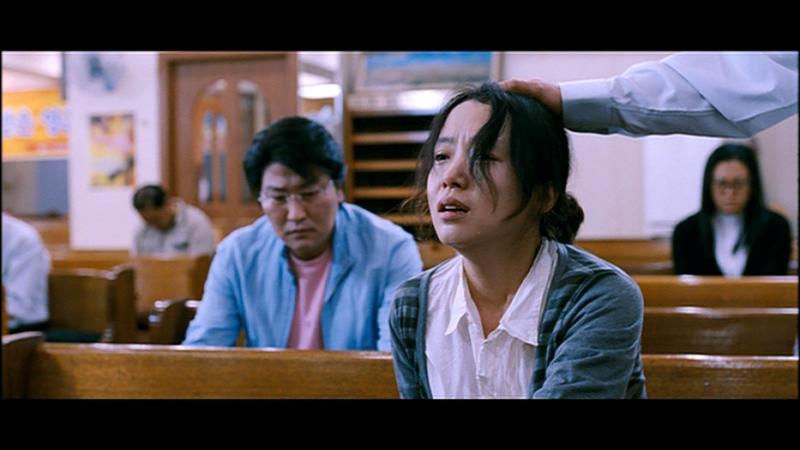 Her bragging has a disastrous side-effect -- the kidnapping (for ransom) of her child. Though she cooperates as well as she can, she has far less money to hand over than the kidnapper expected. Whether because of this (or, more likely, the fact that the boy knew his kidnapper personally), the boy is found dead.
Her bragging has a disastrous side-effect -- the kidnapping (for ransom) of her child. Though she cooperates as well as she can, she has far less money to hand over than the kidnapper expected. Whether because of this (or, more likely, the fact that the boy knew his kidnapper personally), the boy is found dead.
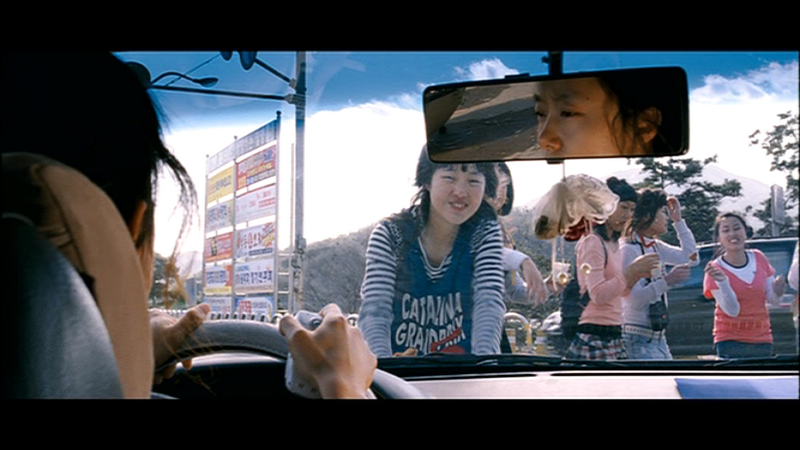 Through all Shin-ae's troubles, her mechanic friend is willing to help the best he can (at first one suspects he merely has romantic designs -- but as her troubles mount, it is clear that he is truly devoted to her, despite the lack of any real gratitude on her part). Thoroughly sunk in grief, Shin-ae accepts the invitation of Evangelical Christian neighbors to a religious service.
Through all Shin-ae's troubles, her mechanic friend is willing to help the best he can (at first one suspects he merely has romantic designs -- but as her troubles mount, it is clear that he is truly devoted to her, despite the lack of any real gratitude on her part). Thoroughly sunk in grief, Shin-ae accepts the invitation of Evangelical Christian neighbors to a religious service. 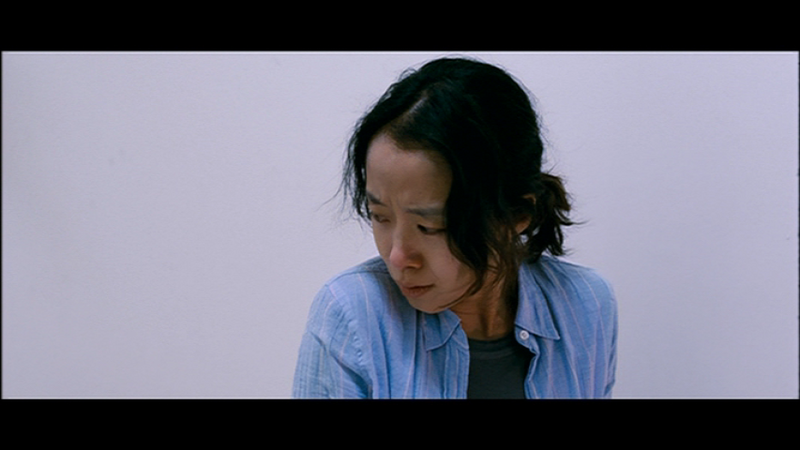 Her devoted friend gamely goes along to keep her company. For a while, it seems Shin-ae has found a release from her pain in religion. But when she goes to visit the murderer in prison to offer forgiveness, she is infuriated to discover that he believes God has already forgiven him. She spirals into another slump, feeling God and religion have betrayed her, taking petty revenge against various Evangelical Christians.
Her devoted friend gamely goes along to keep her company. For a while, it seems Shin-ae has found a release from her pain in religion. But when she goes to visit the murderer in prison to offer forgiveness, she is infuriated to discover that he believes God has already forgiven him. She spirals into another slump, feeling God and religion have betrayed her, taking petty revenge against various Evangelical Christians. 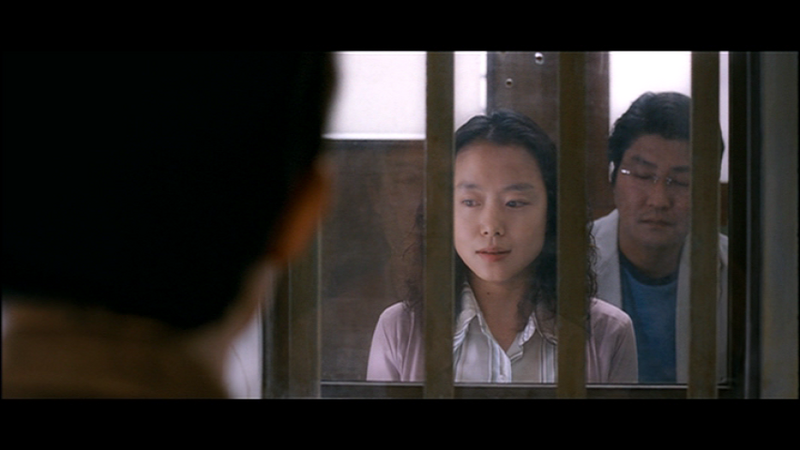 Her mechanic friend continues to be ready to help out where he can -- but unexpectedly still remains involved with the religious community Shin-ae has abandoned. One is discomfited at several points by Shin-ae's indifference (or outright hostility) to the murderer's (apparently totally innocent) teen-aged daughter. The ending is, to me, quite open and inconclusive.
Her mechanic friend continues to be ready to help out where he can -- but unexpectedly still remains involved with the religious community Shin-ae has abandoned. One is discomfited at several points by Shin-ae's indifference (or outright hostility) to the murderer's (apparently totally innocent) teen-aged daughter. The ending is, to me, quite open and inconclusive.
The performances here are first rate -- not just Jeon's award-winning one but equally that of Song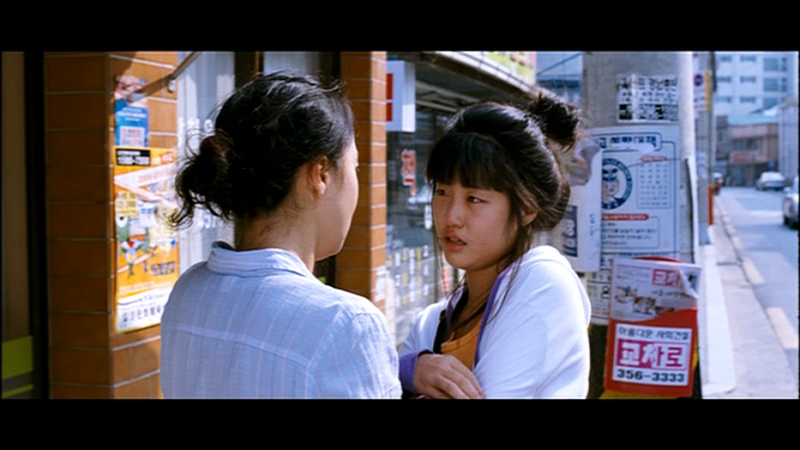 (not unexpectedly -- as he is almost always dependably excellent). More surprisingly, the first-time actress Song Mi-rim who plays the murderer's daughter is quite convincing (disappointingly, but rather charmingly, she decided she didn't really enjoy acting all that much -- and has rejected out of hand all proposals that she appear in another film).
(not unexpectedly -- as he is almost always dependably excellent). More surprisingly, the first-time actress Song Mi-rim who plays the murderer's daughter is quite convincing (disappointingly, but rather charmingly, she decided she didn't really enjoy acting all that much -- and has rejected out of hand all proposals that she appear in another film).
The film is generally rather subdued looking (especially compared to the vivid Old Garden), but visually quite effective nonetheless. Cinematography was handled by Cho Yong-kyou, who previously shot Bong Joon-ho's remarkable Barking Dogs Never Bite. The Korean special edition DVD set (which has English subtitles for the film) is quite lavish but rather impractical in design.
but visually quite effective nonetheless. Cinematography was handled by Cho Yong-kyou, who previously shot Bong Joon-ho's remarkable Barking Dogs Never Bite. The Korean special edition DVD set (which has English subtitles for the film) is quite lavish but rather impractical in design.
A few more screen shots:
http://i9.photobucket.com/albums/a59/mkerpan/oct_07/milyang10.png
http://i9.photobucket.com/albums/a59/mkerpan/oct_07/milyang11.png
http://i9.photobucket.com/albums/a59/mkerpan/oct_07/milyang14.png
http://i9.photobucket.com/albums/a59/mkerpan/oct_07/milyang15.png
http://i9.photobucket.com/albums/a59/mkerpan/oct_07/milyang16.png
http://i9.photobucket.com/albums/a59/mkerpan/oct_07/milyang17.png
 As far as I can tell, this film appears to be the oldest Japanese feature film that survives in essentially complete form. And it is also one of the first to feature women (and girls) playing female characters. Given its early date,
As far as I can tell, this film appears to be the oldest Japanese feature film that survives in essentially complete form. And it is also one of the first to feature women (and girls) playing female characters. Given its early date,  I was rather surprised to discover just how sophisticated this film was, both visually and narratively. The film follows several groups of people, whose paths intersect at least briefly. Some of the characters are wanderers, others are not.
I was rather surprised to discover just how sophisticated this film was, both visually and narratively. The film follows several groups of people, whose paths intersect at least briefly. Some of the characters are wanderers, others are not.  The two primary groups are a man with his wife and young daughter, and a couple of tramps recently released from prison. We also have a teenaged brother and sister who are itinerant performers, the members of a couple of well-to-do rural households, and a group of poor rural workers.
The two primary groups are a man with his wife and young daughter, and a couple of tramps recently released from prison. We also have a teenaged brother and sister who are itinerant performers, the members of a couple of well-to-do rural households, and a group of poor rural workers.  The stories used in this film are drawn from various sources, including Gorky's Lower Depths and a German melodrama. The film jumps from group to group, from present to past and back, and into daydreams and alternative versions of reality.
The stories used in this film are drawn from various sources, including Gorky's Lower Depths and a German melodrama. The film jumps from group to group, from present to past and back, and into daydreams and alternative versions of reality. Given the multiplicity of characters and plot lines, it is almost impossible to present a simple version of what goes on in this film. At the core of the film, however is a prodigal son seeking forgiveness (or at least acceptance of his innocent wife and daughter)
Given the multiplicity of characters and plot lines, it is almost impossible to present a simple version of what goes on in this film. At the core of the film, however is a prodigal son seeking forgiveness (or at least acceptance of his innocent wife and daughter)  from a harsh and unbending father. In this case, we see the past as well as the present of this broken family. For contrast, we see another wealthy household, headed by a teen-aged girl (doing her best to look like Mary Pickford) and the steward of the estate.
from a harsh and unbending father. In this case, we see the past as well as the present of this broken family. For contrast, we see another wealthy household, headed by a teen-aged girl (doing her best to look like Mary Pickford) and the steward of the estate.  She seems to be especially fond of a handsome young man who helps with chores (played by the director himself). The wandering ex-convicts luckily cross paths with this household rather than the other. As it is Christmas-time, the congenial household prepares for a party.
She seems to be especially fond of a handsome young man who helps with chores (played by the director himself). The wandering ex-convicts luckily cross paths with this household rather than the other. As it is Christmas-time, the congenial household prepares for a party.  Its young mistress, feeling that they need more people to join in the celebration, sends her carriage to pick up the residents from the district's shelter for the poor. Meanwhile, the prodigal and his family get a far less welcoming reception -- despite the time of year and the threatening weather (a major snow storm is coming).
Its young mistress, feeling that they need more people to join in the celebration, sends her carriage to pick up the residents from the district's shelter for the poor. Meanwhile, the prodigal and his family get a far less welcoming reception -- despite the time of year and the threatening weather (a major snow storm is coming). Visually, the film's makers seem to have been keeping very much up-to-date as to what was going on in Hollywood technique-wise (despite the fact that this was shot by the head of the conservative cinematographic faction at Shochiku). But more importantly,
Visually, the film's makers seem to have been keeping very much up-to-date as to what was going on in Hollywood technique-wise (despite the fact that this was shot by the head of the conservative cinematographic faction at Shochiku). But more importantly,  the visual imagery is often quite striking -- and beautiful. Apparently, the direction here was shared (to a considerable extent) by Kaoru Osanai (who played the hardbitten father and was also the film's executive producer),
the visual imagery is often quite striking -- and beautiful. Apparently, the direction here was shared (to a considerable extent) by Kaoru Osanai (who played the hardbitten father and was also the film's executive producer),  one of the leaders of Japan's shingeki (new theater) movement. While a subtitled print circulated a few years ago, as part of Shochiku's 110th anniversary retrospective, there is unfortunately no subbed (or even unsubbed) DVD available at present.
one of the leaders of Japan's shingeki (new theater) movement. While a subtitled print circulated a few years ago, as part of Shochiku's 110th anniversary retrospective, there is unfortunately no subbed (or even unsubbed) DVD available at present.Orae-doen jeongwon / The Old Garden (IM Sang-soo, 2006)
 Im's woefully under-appreciated President's Last Bang was one of the most savage black comedies of recent years. Rather than focusing on those at the top of the political world in his newest film,
Im's woefully under-appreciated President's Last Bang was one of the most savage black comedies of recent years. Rather than focusing on those at the top of the political world in his newest film,  he depicts the students involved in the unrest at the beginning of the 1980s and looks at the fate of at least a few of them. The main focus is on Oh Hyun-woo, a student activist (played by Ji Jin-hee), and Han Yoon-hee, a painter (played by Yum Jung-ah -- the stepmother in Tale of Two Sisters).
he depicts the students involved in the unrest at the beginning of the 1980s and looks at the fate of at least a few of them. The main focus is on Oh Hyun-woo, a student activist (played by Ji Jin-hee), and Han Yoon-hee, a painter (played by Yum Jung-ah -- the stepmother in Tale of Two Sisters).  Casual acquaintances at first, the two become romanticaly involved when Oh (on the run from the police) hides out at Yoon-hee's rural retreat (presumably her family's ancestral farm). He gets caught after returning to fight the good fight, and is sent to prison (where he is tortured) for seventeen years.
Casual acquaintances at first, the two become romanticaly involved when Oh (on the run from the police) hides out at Yoon-hee's rural retreat (presumably her family's ancestral farm). He gets caught after returning to fight the good fight, and is sent to prison (where he is tortured) for seventeen years.  She is left alone, pregnant. Not being married, she is not allowed to visit him in prison (or even have her letters to him delivered). She goes on with her painting, but develops cancer and dies before his release -- leaving her 10 year-old child to be raised by relatives.
She is left alone, pregnant. Not being married, she is not allowed to visit him in prison (or even have her letters to him delivered). She goes on with her painting, but develops cancer and dies before his release -- leaving her 10 year-old child to be raised by relatives. One learns the basis scenario of the film very early on, so little I said above really constitutes a spoiler. The film actually starts with the day Oh is released. Im shuttles us back and forth in time --
One learns the basis scenario of the film very early on, so little I said above really constitutes a spoiler. The film actually starts with the day Oh is released. Im shuttles us back and forth in time --  as Oh is reunited with his own family, visits old activist colleagues, and returns to the place where he lived with Yoon-hee. While the plot outline may sounds melodramatic and depressing, the film itself has a more optimistic and positive tone.
as Oh is reunited with his own family, visits old activist colleagues, and returns to the place where he lived with Yoon-hee. While the plot outline may sounds melodramatic and depressing, the film itself has a more optimistic and positive tone.  This is one of the most visually compelling films of the past year or so -- and the subtitled Korean DVD does a good job of presenting it (pending its unlikely distribution in the United States).
This is one of the most visually compelling films of the past year or so -- and the subtitled Korean DVD does a good job of presenting it (pending its unlikely distribution in the United States).More screen shots:
http://i9.photobucket.com/albums/a59/mkerpan/oct_07/garden01.png
http://i9.photobucket.com/albums/a59/mkerpan/oct_07/garden04.png
http://i9.photobucket.com/albums/a59/mkerpan/oct_07/garden05.png
http://i9.photobucket.com/albums/a59/mkerpan/oct_07/garden06.png
http://i9.photobucket.com/albums/a59/mkerpan/oct_07/garden09.png
http://i9.photobucket.com/albums/a59/mkerpan/oct_07/garden13.png
http://i9.photobucket.com/albums/a59/mkerpan/oct_07/garden14.png
http://i9.photobucket.com/albums/a59/mkerpan/oct_07/garden15.png
http://i9.photobucket.com/albums/a59/mkerpan/oct_07/garden16.png
http://i9.photobucket.com/albums/a59/mkerpan/oct_07/garden17.png
http://i9.photobucket.com/albums/a59/mkerpan/oct_07/garden18.png
http://i9.photobucket.com/albums/a59/mkerpan/oct_07/garden19.png
http://i9.photobucket.com/albums/a59/mkerpan/oct_07/garden20.png
Milyang / Secret Sunshine (LEE Chang-dong, 2007)
 Possibly the best film of the past year, and almost surely one of the most emotionally wrenching. If one is worried about spoilers, stop reading now -- as one can not talk intelligibly about the film without confronting just what happens in this film.
Possibly the best film of the past year, and almost surely one of the most emotionally wrenching. If one is worried about spoilers, stop reading now -- as one can not talk intelligibly about the film without confronting just what happens in this film.  It is primarily about a woman's response to the murder of her son by a kidnapper. The woman here is portrayed in an almost unbearably realistic fashion by Jeon Do-yeon (who won the best actress award at Cannes for her efforts).
It is primarily about a woman's response to the murder of her son by a kidnapper. The woman here is portrayed in an almost unbearably realistic fashion by Jeon Do-yeon (who won the best actress award at Cannes for her efforts). Jeon plays Shin-ae, a widow with a young son -- who moves to Milyang (her husband's birthplace) after his death. The move might have made some sense if her husband's family still lived in the town, but they don't. So she winds up in a rather minor town, knowing no one, hoping to set up in business giving piano lessons.
Jeon plays Shin-ae, a widow with a young son -- who moves to Milyang (her husband's birthplace) after his death. The move might have made some sense if her husband's family still lived in the town, but they don't. So she winds up in a rather minor town, knowing no one, hoping to set up in business giving piano lessons.  Luckily, she knows one person there, Jong Chan, a car repairman (Song Kang-ho) who came to her aid when her car broke down at the end of her move, right as she was near the edge of town. Shin-ae has a bit of trouble fitting in, as she doesn't have the best social skills and judgment. Trying to impress her fellow small business people, she claims to be in the market for a big real estate investment.
Luckily, she knows one person there, Jong Chan, a car repairman (Song Kang-ho) who came to her aid when her car broke down at the end of her move, right as she was near the edge of town. Shin-ae has a bit of trouble fitting in, as she doesn't have the best social skills and judgment. Trying to impress her fellow small business people, she claims to be in the market for a big real estate investment.  Her bragging has a disastrous side-effect -- the kidnapping (for ransom) of her child. Though she cooperates as well as she can, she has far less money to hand over than the kidnapper expected. Whether because of this (or, more likely, the fact that the boy knew his kidnapper personally), the boy is found dead.
Her bragging has a disastrous side-effect -- the kidnapping (for ransom) of her child. Though she cooperates as well as she can, she has far less money to hand over than the kidnapper expected. Whether because of this (or, more likely, the fact that the boy knew his kidnapper personally), the boy is found dead. Through all Shin-ae's troubles, her mechanic friend is willing to help the best he can (at first one suspects he merely has romantic designs -- but as her troubles mount, it is clear that he is truly devoted to her, despite the lack of any real gratitude on her part). Thoroughly sunk in grief, Shin-ae accepts the invitation of Evangelical Christian neighbors to a religious service.
Through all Shin-ae's troubles, her mechanic friend is willing to help the best he can (at first one suspects he merely has romantic designs -- but as her troubles mount, it is clear that he is truly devoted to her, despite the lack of any real gratitude on her part). Thoroughly sunk in grief, Shin-ae accepts the invitation of Evangelical Christian neighbors to a religious service.  Her devoted friend gamely goes along to keep her company. For a while, it seems Shin-ae has found a release from her pain in religion. But when she goes to visit the murderer in prison to offer forgiveness, she is infuriated to discover that he believes God has already forgiven him. She spirals into another slump, feeling God and religion have betrayed her, taking petty revenge against various Evangelical Christians.
Her devoted friend gamely goes along to keep her company. For a while, it seems Shin-ae has found a release from her pain in religion. But when she goes to visit the murderer in prison to offer forgiveness, she is infuriated to discover that he believes God has already forgiven him. She spirals into another slump, feeling God and religion have betrayed her, taking petty revenge against various Evangelical Christians.  Her mechanic friend continues to be ready to help out where he can -- but unexpectedly still remains involved with the religious community Shin-ae has abandoned. One is discomfited at several points by Shin-ae's indifference (or outright hostility) to the murderer's (apparently totally innocent) teen-aged daughter. The ending is, to me, quite open and inconclusive.
Her mechanic friend continues to be ready to help out where he can -- but unexpectedly still remains involved with the religious community Shin-ae has abandoned. One is discomfited at several points by Shin-ae's indifference (or outright hostility) to the murderer's (apparently totally innocent) teen-aged daughter. The ending is, to me, quite open and inconclusive.The performances here are first rate -- not just Jeon's award-winning one but equally that of Song
 (not unexpectedly -- as he is almost always dependably excellent). More surprisingly, the first-time actress Song Mi-rim who plays the murderer's daughter is quite convincing (disappointingly, but rather charmingly, she decided she didn't really enjoy acting all that much -- and has rejected out of hand all proposals that she appear in another film).
(not unexpectedly -- as he is almost always dependably excellent). More surprisingly, the first-time actress Song Mi-rim who plays the murderer's daughter is quite convincing (disappointingly, but rather charmingly, she decided she didn't really enjoy acting all that much -- and has rejected out of hand all proposals that she appear in another film).The film is generally rather subdued looking (especially compared to the vivid Old Garden),
 but visually quite effective nonetheless. Cinematography was handled by Cho Yong-kyou, who previously shot Bong Joon-ho's remarkable Barking Dogs Never Bite. The Korean special edition DVD set (which has English subtitles for the film) is quite lavish but rather impractical in design.
but visually quite effective nonetheless. Cinematography was handled by Cho Yong-kyou, who previously shot Bong Joon-ho's remarkable Barking Dogs Never Bite. The Korean special edition DVD set (which has English subtitles for the film) is quite lavish but rather impractical in design.A few more screen shots:
http://i9.photobucket.com/albums/a59/mkerpan/oct_07/milyang10.png
http://i9.photobucket.com/albums/a59/mkerpan/oct_07/milyang11.png
http://i9.photobucket.com/albums/a59/mkerpan/oct_07/milyang14.png
http://i9.photobucket.com/albums/a59/mkerpan/oct_07/milyang15.png
http://i9.photobucket.com/albums/a59/mkerpan/oct_07/milyang16.png
http://i9.photobucket.com/albums/a59/mkerpan/oct_07/milyang17.png
Comments